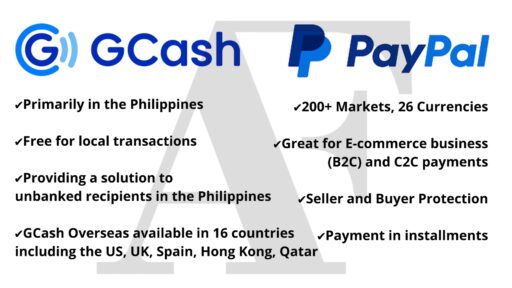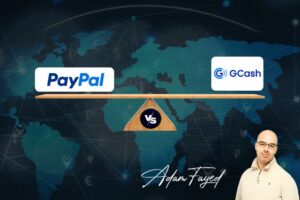As digital wallets become more and more a part of everyday financial exchange, PayPal and GCash have both risen to the fore in their respective markets.
This post examines the various offerings, fees, security measures, and general user experiences provided by each service provider.
With a focus on international access, our PayPal vs GCash review aims to clarify which option would suit your individual or entrepreneurial needs best.
If you are looking to invest as an expat or high-net-worth individual, which is what I specialize in, you can email me (advice@adamfayed.com) or WhatsApp (+44-7393-450-837).
This includes if you are looking for a second opinion or alternative investments.
Some facts might change from the time of writing. Nothing written here is financial, legal, tax, or any kind of individual advice or a solicitation to invest.

Who is PayPal?
Initially founded in 1998 by Peter Thiel, Max Levchin, and Luke Nosek as Confinity, PayPal eventually merged with Elon Musk’s X.com in 2000. This is a process that enabled PayPal to be one of the earliest and most well-known electronic payment systems.
PayPal was later acquired by eBay in 2002 before eventually being restarted as an independent business in 2015.
What does PayPal do?
- Domestic and cross-border fund transfers
- Online business payment processing services
- Buyer and seller protection programs
- PayPal Credit financing facilities
- Buying, holding, and selling cryptocurrencies
- PayPal Business accounts with enhanced features
- E-commerce solution integration
Who is GCash?
GCash launched in 2004 from the philippines’ largest telecommunications provider, Globe Telecom. It is currently operated by Mynt ( (Globe Fintech Innovations, Inc.).
It transitioned from being a basic mobile wallet to becoming the philippines’ top financial application with more than 60 million consumers. This even covers a populace without bank accounts via generally low banking penetrations.

What does GCash do?
- Mobile wallet services with QR code payments
- Peer-to-peer money transfers within the Philippines
- Bill payments to 900+ billers
- Online and in-store merchant payments
- Bank transfers to 40+ Philippine banks
- International remittance receiving (via partners)
- Micro-investment options (GInvest)
- Micro-insurance products
- Credit line services (GCredit)
- Savings accounts with interest (GSave)
- Cryptocurrency trading through partners
Who charges less, PayPal or GCash?
How much does PayPal charge?
PayPal has both a percentage system fee and a flat charge fee structure with variation depending on the type of transaction and geo-location.
Funds transferred within the country from a linked bank or PayPal funds are fee-free and would thus be best used in paying a family member or friend.
Transfers done via card however, have a fee of 2.9% and flat charge (e.g., $0.30 for domestic US funds transfers).
International personal transactions are charged an additional 5% fee on top of that. Currency conversions may also cost you 3~4%.
In certain areas—outside the U.S. and Europe, of course, particularly—cash withdrawals also have a fee .
PayPal raised its biggest fee hike in a decade on January 13, 2025, increasing processing fees on its Buy Now Pay Later (BNPL) product. It hiked the rate from 3.49% to 4.99% + a flat rate—a 43% hike that has turned BNPL into the most profitable payment method for the platform, even above regular credit card fees.
For U.S. merchants, the following is part of the fee structure:
- Card-present or QR code transactions through PayPal Zettle: 2.29% + $0.09
- QR code payments: 2.29%+ fixed fee $0.09
- Credit card and debit card payments: 2.89% or 2.99%+ fixed fee
- PayPal Checkout: 3.49% + fixed fee $0.49
- Transactions with Pay Later option: 4.99% + fixed fee $0.49
- Invoicing transactions: 2.99% to 4.99% + a fixed fee $0.49
For cross-border payments or transactions requiring currency conversion, an additional spread (3~4%) can be charged on top of domestic rates. Such fees cover PayPal’s extensive overseas network and the services are made easy.
Chargebacks ($20), payment disputes ($15) have additional charges.
The combination of percentage charges, fixed charges, and exchange markups can turn small-value overseas payments into costly affairs for foreign companies.
How much does GCash charge?
GCash, the top mobile wallet in the Philippines, has a local bias but is increasingly offering international facilities through associations.
The service uses an open two-tier fee system with most local transactions free or inexpensive and international services with higher fees scaled to association prices.
GCash-to-GCash transfer is likewise free for local transactions, presenting an attractive and easy choice for local peer-to-peer transfers.
Cash-in and loading funds are mainly free through bank deposits and partner retailers but incur a 2.5% cost via convenience means such as credit cards.
Fee for cash-outs varies between ₱20-50 ($0.35-0.90) at partner retailers up to 2% of the value being cashed out using an ATM cash-out.
Bill payments, merchant payments, and government service fee payments are free.
However, there is a 1-2% processing fee for certain special services such as real estate payments.
The platform’s merchant QR code payment system costs 0.5-1.5% depending on the merchant category, which is much lower than regular credit card processing fees.
For overseas services remittances, GCash has deals with Western Union, WorldRemit, and Ria wherein the foreign Filipino receives money directly into GCash wallets.
Sending partners charge such remittances’ fees and not GCash, and that usually ranges between $3.99-7.99 with currency exchange charges of 0.5-3% over mid-market prices.
GCash’s pricing model predominantly focuses on keeping local transactions inexpensive and leveraging partnerships for overseas abilities. This has been one of the key reasons behind its dominance in the Philippines’ online payment market, especially in the large unbanked community.
In the case of remittances sent by foreign Filipinos, the partnership transfer fee plus the option to receive free via GCash tends to be cheaper than other conventional remittance means.
To get a precise estimate, you can check the GCash official website.
Which is better PayPal or GCash?

PayPal is used in more than 200 nations and supports 26 currencies, so it’s one of the most widely supported payment systems.
It transfers money between PayPal accounts in near-real-time, and bank transfers normally take 1–3 business days.
Its Seller Protection scheme is strong and allows merchants to handle fraud risk, and Buyer Protection is meant to guarantee that buyers get what they were ordered.
Apart from this, PayPal has also broadened the services it offers to encompass point-of-sale facilities like PayPal Here and QR code payment, thus injecting flexibility between online and offline payments.
GCash is an inclusive digital money ecosystem for Filipinos, both banked and unbanked.
The service has a 40,000+ network of partner outlets to make cash-in and cash-out accessible even without traditional banking relationships.
GCash’s tie-up with Alipay has introduced innovative financial technology to the Philippine market.
The platform has been widened to include lifestyle services such as payment for food delivery, transportation, and government service charges.
GCash is mainly in Philippine pesos but can receive international remittances through partners such as Western Union, Remitly, and WorldRemit.
Conclusion
PayPal’s international presence and inherent trust factor make it an appealing choice for cross-border transactions.
Nevertheless, if you’d prefer a mobile-based, geo-enhanced experience, GCash is the ticket.
Both have their merits, and your best strategy will be tied to your personal transactional preference and geographic focus.
Ongoing monitoring and keen analysis of each service is the order of the day to see that you continue to make the most educated money decisions.
Pained by financial indecision?

Adam is an internationally recognised author on financial matters with over 830million answer views on Quora, a widely sold book on Amazon, and a contributor on Forbes.



